- Joined
- Mar 7, 2023
- Messages
- 2,077 (4.72/day)
- Location
- South East, UK
OneRaichu has conducted a series of Geekbench 6.2 tests on an Intel Core i9-14900KF CPU, very likely a preview sample—his results have arrived for public viewing in the form of three new database entries. The hardware enthusiast (and sometimes leaker) is expected to produce a full review of said flagship Raptor Lake Refresh processor. His evaluation arrives roughly a week after leaked Intel Core i9-14900K processors appearing online, via benchmark results produced in Geekbench 6.1 and CPU-Z. The KF variant is missing an integrated GPU, while its K sibling is likely endowed with a bog standard Intel UHD Graphics 700-series iGPU.
The database entries reveal single-core scores starting at 3322 and going up to 3347 points. Multi-core scores span from 22895 through to 23051 points. A Geekbench 5 result is thrown in for good measure, with achievements of 2412 points in single-core, and 26972 points in multi-core performance. OneRaichu's test build utilized an ASRock Z790 Taichi motherboard and 32 GB of DDR5-7000 memory, his OS of choice appears to be Microsoft Windows 11 (non-Pro) 64-bit. VideoCardz has crunched the numbers: "preliminary benchmarks suggest that the Core i9-14900KF outperforms the i9-13900K by approximately 5-6% in multi-threaded tests and a minimum 12% improvement in single-core performance."
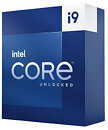
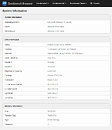
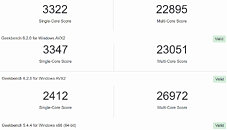
Their evaluation continues: "However, it's crucial to bear in mind that we lack detailed information regarding the test settings employed by OneRaichu during these evaluations, so these scores may not provide a complete and accurate representation of the processor's overall capabilities."
VideoCardz has kindly produced some comparison charts based on the latest Geekbench data:
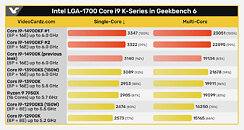
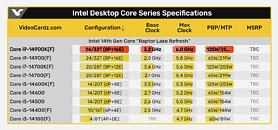
View at TechPowerUp Main Site | Source
The database entries reveal single-core scores starting at 3322 and going up to 3347 points. Multi-core scores span from 22895 through to 23051 points. A Geekbench 5 result is thrown in for good measure, with achievements of 2412 points in single-core, and 26972 points in multi-core performance. OneRaichu's test build utilized an ASRock Z790 Taichi motherboard and 32 GB of DDR5-7000 memory, his OS of choice appears to be Microsoft Windows 11 (non-Pro) 64-bit. VideoCardz has crunched the numbers: "preliminary benchmarks suggest that the Core i9-14900KF outperforms the i9-13900K by approximately 5-6% in multi-threaded tests and a minimum 12% improvement in single-core performance."



Their evaluation continues: "However, it's crucial to bear in mind that we lack detailed information regarding the test settings employed by OneRaichu during these evaluations, so these scores may not provide a complete and accurate representation of the processor's overall capabilities."
VideoCardz has kindly produced some comparison charts based on the latest Geekbench data:


View at TechPowerUp Main Site | Source



